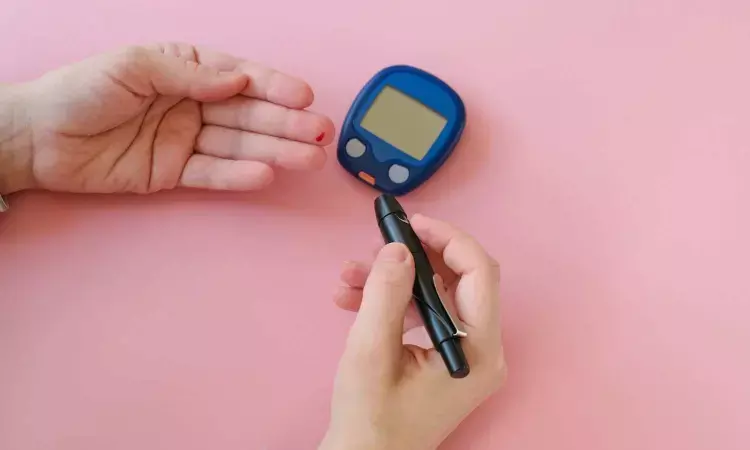- Home
- Medical news & Guidelines
- Anesthesiology
- Cardiology and CTVS
- Critical Care
- Dentistry
- Dermatology
- Diabetes and Endocrinology
- ENT
- Gastroenterology
- Medicine
- Nephrology
- Neurology
- Obstretics-Gynaecology
- Oncology
- Ophthalmology
- Orthopaedics
- Pediatrics-Neonatology
- Psychiatry
- Pulmonology
- Radiology
- Surgery
- Urology
- Laboratory Medicine
- Diet
- Nursing
- Paramedical
- Physiotherapy
- Health news
- Fact Check
- Bone Health Fact Check
- Brain Health Fact Check
- Cancer Related Fact Check
- Child Care Fact Check
- Dental and oral health fact check
- Diabetes and metabolic health fact check
- Diet and Nutrition Fact Check
- Eye and ENT Care Fact Check
- Fitness fact check
- Gut health fact check
- Heart health fact check
- Kidney health fact check
- Medical education fact check
- Men's health fact check
- Respiratory fact check
- Skin and hair care fact check
- Vaccine and Immunization fact check
- Women's health fact check
- AYUSH
- State News
- Andaman and Nicobar Islands
- Andhra Pradesh
- Arunachal Pradesh
- Assam
- Bihar
- Chandigarh
- Chattisgarh
- Dadra and Nagar Haveli
- Daman and Diu
- Delhi
- Goa
- Gujarat
- Haryana
- Himachal Pradesh
- Jammu & Kashmir
- Jharkhand
- Karnataka
- Kerala
- Ladakh
- Lakshadweep
- Madhya Pradesh
- Maharashtra
- Manipur
- Meghalaya
- Mizoram
- Nagaland
- Odisha
- Puducherry
- Punjab
- Rajasthan
- Sikkim
- Tamil Nadu
- Telangana
- Tripura
- Uttar Pradesh
- Uttrakhand
- West Bengal
- Medical Education
- Industry
Imeglimin lowers CVD risk by improving postprandial flow-mediated dilation among diabetes patients

Cardiovascular disease (CVD) is the major cause of mortality in type 2 diabetes and high blood sugar, dyslipidemia, and hypertension are risk factors that contribute significantly to atherosclerosis.
A recent research published in Diabetes Therapy suggests that imeglimin treatment improved flow-mediated dilation (FMD) two hours after eating. Further Imeglimin may have improved postprandial FMD by lowering postprandial blood sugar and impacting factors unrelated to blood sugar control. These effects may have a favorable impact on CVD in patients with type 2 diabetes.
Diabetes patients are at risk for endothelial dysfunction, which can lead to cardiovascular disease. Because this dysfunction may be a first, reversible stage in the development of atherosclerosis and cardiovascular disease, early diagnosis of endothelial dysfunction is essential for its prevention. Imeglimin is a brand-new anti-diabetic medication that increases insulin sensitivity and glucose-stimulated insulin secretion (GSIS). Imeglimin being a new emerging oral hypoglycemic medication therefore, Uchida and colleagues investigation this under the assumption of endothelial function enhancement.
Imeglimin was given to participants in this trial who had type 2 diabetes and a HbA1c of less than 6.5% but were not taking insulin treatment. Before and three months after injection, a meal tolerance test (592 kcal, 75.0 g of glucose, and 28.5 g of fat) was conducted, and blood sugar, glucagon, endothelium function insulin, and triglycerides were measured. Flow-mediated dilation was used to evaluate endothelial function.
The key findings of this study were:
Twelve patients, with a median age of 55.5 years (having interquartile range [IQR] of 51.3-66.0) and a gender ratio of 50% male, were enrolled.
Although there were no differences in fasting FMD before or 3 months after imeglimin treatment, 2 h postprandial FMD had dramatically improved. Imeglimin treatment improved significantly HbA1c, fasting glucose, and 2 h postprandial glucose in terms of the glucose profile.
In a univariate correlation coefficient analysis, the difference in 2 h postprandial FMD between before and 3 months after imeglimin treatment (2 h postprandial FMD) was inversely linked with 2 h postprandial glucose.
Three months after taking imeglimin, patients' postprandial FMD had improved in both patients with and without lowered postprandial glucose.
Reference:
Uchida, T., Ueno, H., Konagata, A., Taniguchi, N., Kogo, F., Nagatomo, Y., Shimizu, K., Yamaguchi, H., & Shimoda, K. (2023). Improving the Effects of Imeglimin on Endothelial Function: A Prospective, Single-Center, Observational Study. In Diabetes Therapy. Springer Science and Business Media LLC. https://doi.org/10.1007/s13300-023-01370-z
Dr Kartikeya Kohli is an Internal Medicine Consultant at Sitaram Bhartia Hospital in Delhi with super speciality training in Nephrology. He has worked with various eminent hospitals like Indraprastha Apollo Hospital, Sir Gangaram Hospital. He holds an MBBS from Kasturba Medical College Manipal, DNB Internal Medicine, Post Graduate Diploma in Clinical Research and Business Development, Fellow DNB Nephrology, MRCP and ECFMG Certification. He has been closely associated with India Medical Association South Delhi Branch and Delhi Medical Association and has been organising continuing medical education programs on their behalf from time to time. Further he has been contributing medical articles for their newsletters as well. He is also associated with electronic media and TV for conduction and presentation of health programs. He has been associated with Medical Dialogues for last 3 years and contributing articles on regular basis.
Dr Kamal Kant Kohli-MBBS, DTCD- a chest specialist with more than 30 years of practice and a flair for writing clinical articles, Dr Kamal Kant Kohli joined Medical Dialogues as a Chief Editor of Medical News. Besides writing articles, as an editor, he proofreads and verifies all the medical content published on Medical Dialogues including those coming from journals, studies,medical conferences,guidelines etc. Email: drkohli@medicaldialogues.in. Contact no. 011-43720751


